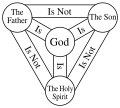Portal:Reformed Christianity
The Reformed Christianity Portal
Reformed Christianity, also called Calvinism, is a major branch of Protestantism that began during the sixteenth-century Protestant Reformation, a schism in the Western Church. Today, it is largely represented by the Continental, Presbyterian, and Congregational traditions, as well as parts of the Anglican and Baptist traditions.
A foundational event that divided the Reformed from the Lutheran tradition occurred in 1529 when reformer Huldrych Zwingli of Zürich broke with Martin Luther on the topic of the Lord's Supper. A separate Reformed tradition developed over several generations, especially in Switzerland, France, Scotland and the Netherlands.
In the seventeenth century, Jacobus Arminius and the Remonstrants were expelled from the Dutch Reformed Church over disputes regarding predestination and salvation, and from that time Arminians are usually considered to be a distinct tradition from the Reformed. This dispute produced the Canons of Dort, the basis for the "doctrines of grace" or "five points" of Calvinism.
Reformed theology emphasizes the authority of the Bible, the sovereignty of God, and covenant theology, a framework for understanding the Bible based on God's covenants with people. Reformed churches have emphasized simplicity in worship. Several forms of ecclesiastical polity are exercised by Reformed churches, including presbyterian, congregational, and some episcopal. (Full article...)
Selected article
Selected images
Did you know...
- ... that the 1919 demolition of "one of the most costly religious edifices" in New York City, the 1906 Madison Square Presbyterian Church, was called "a distinct architectural loss"?
- ...that in Reformed theology, baptism is believed to be a replacement for circumcision as a rite signifying forgiveness of sin?
- ... that five-thousand types of communion tokens have been issued by Presbyterian churches?
Subcategories
Topics
Background: Christianity • St. Augustine • The Reformation • John Calvin • Five Solas • Synod of Dort
Theology: Five Points (TULIP) • Covenant Theology • Regulative principle
Documents: Calvin's Institutes • Confessions of faith • Geneva Bible
Influences: Theodore Beza • John Knox • Jonathan Edwards • Princeton theologians • Henry Cooke
Churches: Reformed • Presbyterian • Congregationalist • Reformed Baptist
Peoples: Afrikaner Calvinists • Huguenots • Pilgrims • Puritans • Scots • Ulster Protestants
WikiProjects
Things to do
 |
Here are some tasks awaiting attention:
|
If those don't satisfy, try wandering through Category:Reformed Christianity articles by quality looking for things to do.
Related portals
Associated Wikimedia
The following Wikimedia Foundation sister projects provide more on this subject:
-
Commons
Free media repository -
Wikibooks
Free textbooks and manuals -
Wikidata
Free knowledge base -
Wikinews
Free-content news -
Wikiquote
Collection of quotations -
Wikisource
Free-content library -
Wikiversity
Free learning tools -
Wiktionary
Dictionary and thesaurus


























